AMQP Bridge Extension Swiftlet
The AMQP Bridge Swiftlet provides bridging functionality between AMQP brokers. Bridges can be defined between SwiftMQ and foreign AMQP brokers as well as between foreign AMQP brokers only. Supported AMQP versions are 0.9.1 and 1.0.
An AMQP bridge consists of a source from which messages are consumed and a target to which messages are sent. Both must have the same AMQP version. Since SwiftMQ supports AMQP 0.9.1 and AMQP 1.0, it is possible to use SwiftMQ as a relay from 2 bridges to convert AMQP 0.9.1 to AMQP 1.0 messages and vice versa.
Example: Bridging between SwiftMQ and foreign AMQP Brokers
In this example, the SwiftMQ Router acts as a source or target and is connected to a foreign AMQP Broker like Qpid Java broker with AMQP 1.0 or RabbitMQ with AMQP 0.9.1.
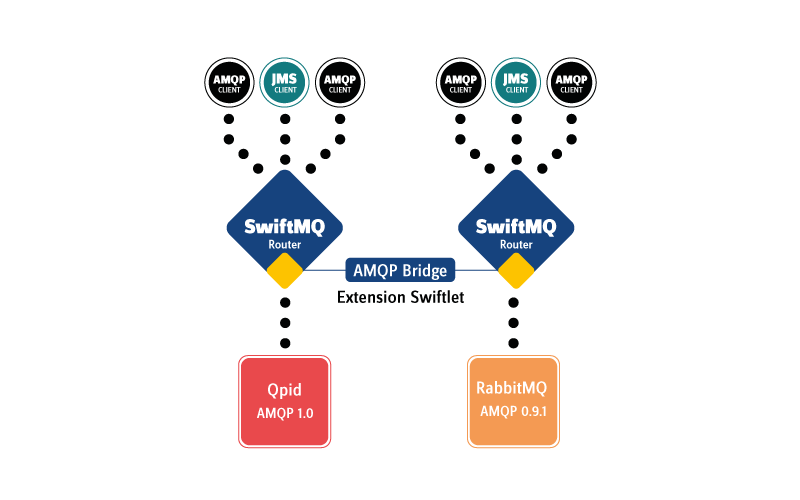
Example: Bridging between foreign AMQP Brokers
In this configuration, the SwiftMQ Router only provides the bridge between foreign AMQP Broker pairs with the same AMQP version.
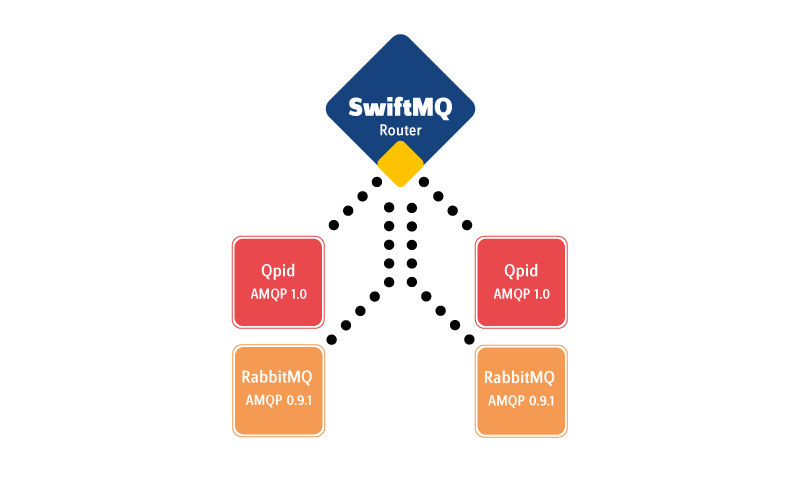
Example: Bridging between AMQP 0.9.1 and AMQP 1.0 with SwiftMQ as a Relay
Here two AMQP brokers of different AMQP versions are connected to a SwiftMQ Router with a relay queue acting as a source or target, respectively. RabbitMQ produces AMQP messages with AMQP version 0.9.1 and stores them into a relay queue at the SwiftMQ Router. From here the messages are transferred as AMQP version 1.0 to the Qpid Java broker.
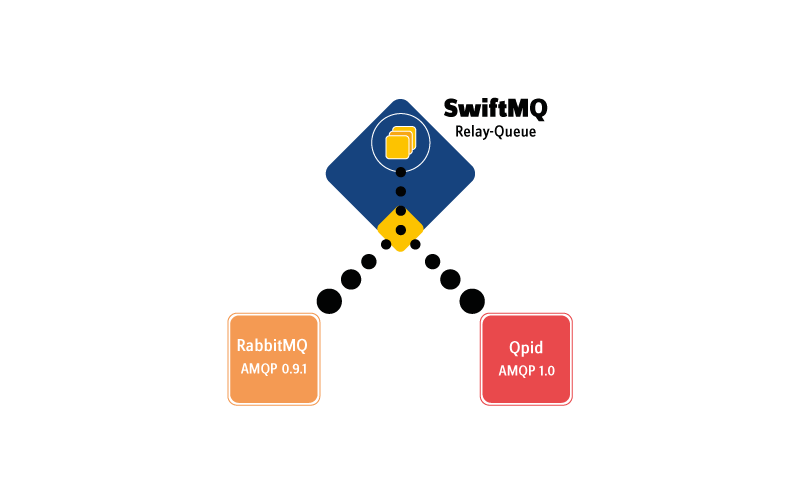
AMQP 1.0 Bridges
Create/Delete a Bridge
Select the AMQP 1.0 Bridges:
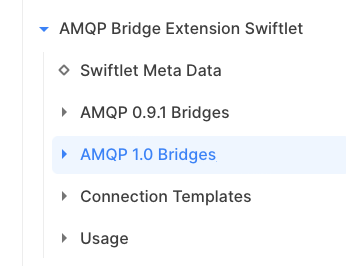
Click on Create a new Entity and enter the name of the bridge but do NOT yet enable it because it needs to be configured first:
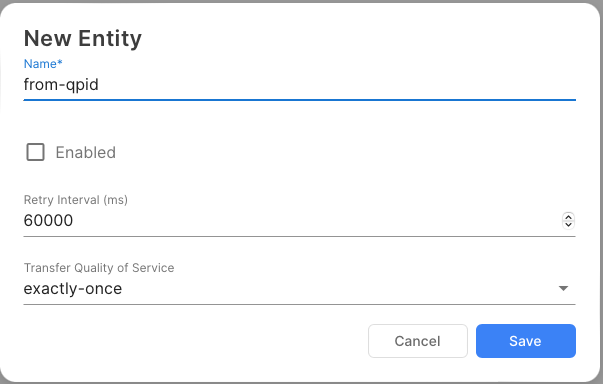
The new bridge appears in the above table. It can be deleted by clicking Delete Entity:

Configure a Bridge
Entity Source specifies the broker where the messages are consumed from, entity Target the broker where the messages are sent to. The attributes of the entities are used to configure the SwiftMQ AMQP 1.0 Java Client which is used internally.
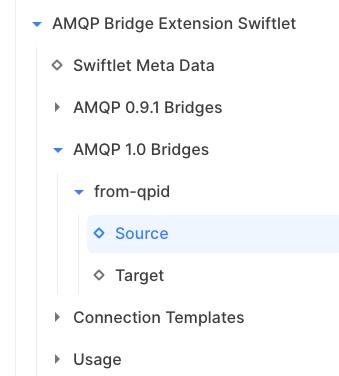
The source and target of a bridge do reference a connection template which is configured here:
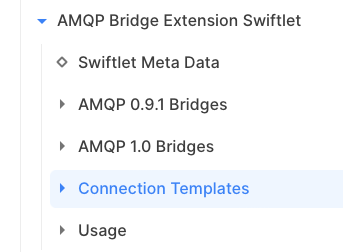
If the name of the connection template is default, default values are used as shown here (a connection template with the name default doesn't need to be created):
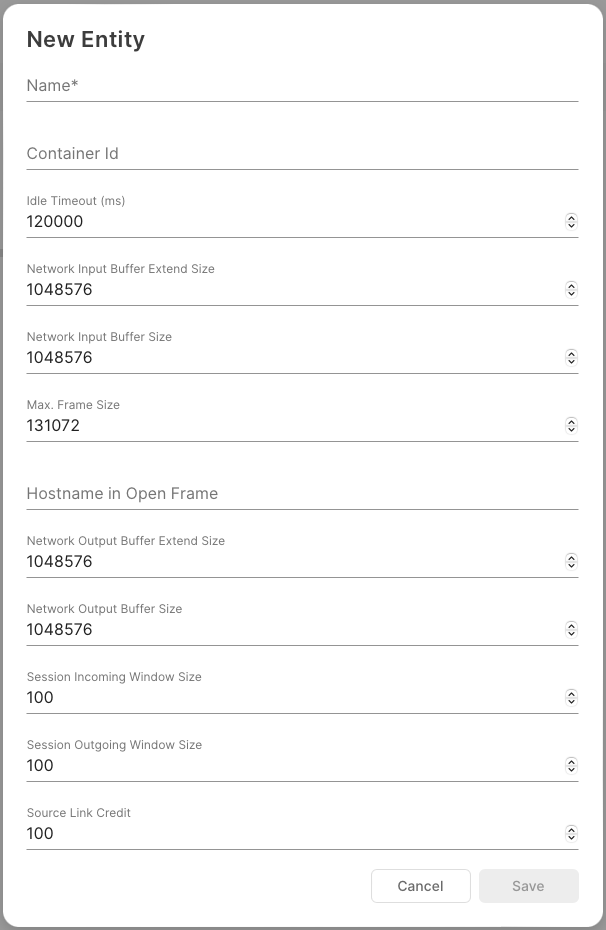
Custom templates can be created and referenced from source and/or targets:
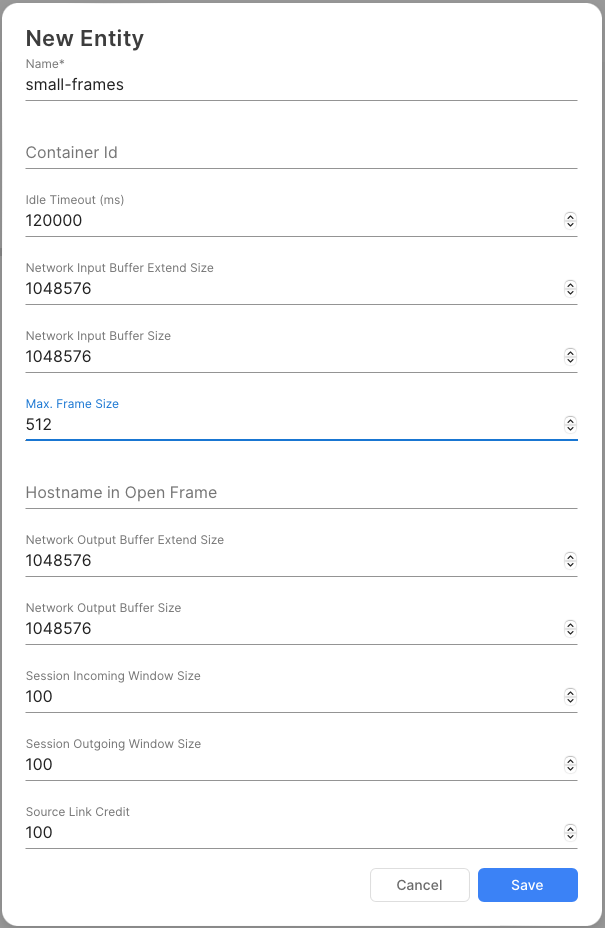
Please have a look at the SwiftMQ AMQP 1.0 Java Client documentation to get further information.
The configuration can be changed at any time but should be done in a disabled state. The changes take effect after the bridge has been enabled again.
Enable/Disable a Bridge
The bridge will be activated by checking the Enabled box:

The bridge now transfers messages if everything is configured properly. To stop it, uncheck the Enabled box.
Monitor a Bridge
Active bridges are listed under the Usage entity of the Swiftlet:
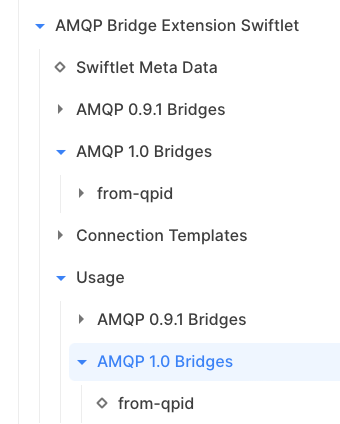
AMQP 0.9.1 Bridges
Install the RabbitMQ Java Client
AMQP 0.9.1 bridges use the RabbitMQ Java client internally. You need to install it first before an AMQP 0.9.1 bridge can be created.
After this Swiftlet has been successfully deployed, unpack it and copy commons-io-x.x.jar and rabbitmq-client.jar into the deployment directory of this Swiftlet.

The Swiftlet then gets automatically redeployed (hot deployment). AMQP 0.9.1 bridges can now be created.
Create/Delete a Bridge
Select the AMQP 0.9.1 Bridges:
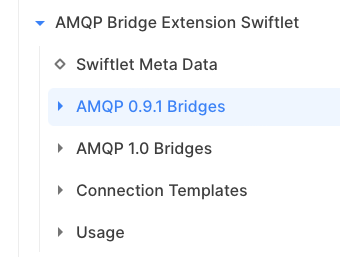
Click on Create a new Entity and enter the name of the bridge but do NOT yet enable it because it needs to be configured first:
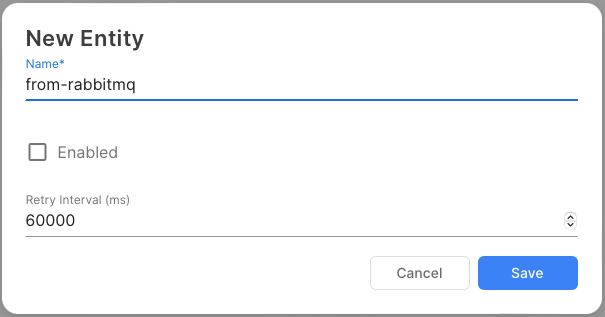
The new bridge appears in the above table. It can be deleted by clicking Delete Entity:

Configure a Bridge
Entity Source specifies the broker where the messages are consumed from, entity Target the broker where the messages are sent to. The attributes of the entities are used to configure the RabbitMQ client.
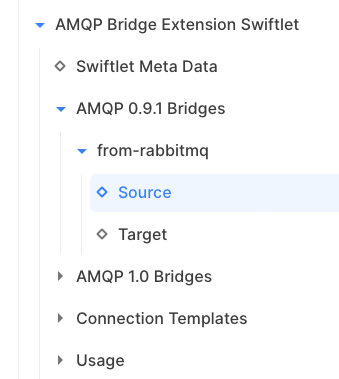
The configuration can be changed at any time but should be done in a disabled state. The changes take effect after the bridge has been enabled again.
Enable/Disable a Bridge
The bridge will be activated by checking the Enabled box.
The bridge now transfers messages if everything is configured properly. To stop it, uncheck the Enabled box.
Please save your configuration! See top of this page.
Monitor a Bridge
Active bridges are listed under the Usage entity of the Swiftlet:
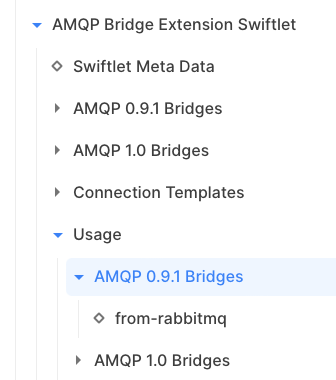
Jobs
The AMQP Bridge Swiftlet registers jobs in job group AMQP Bridge at the Scheduler Swiftlet:
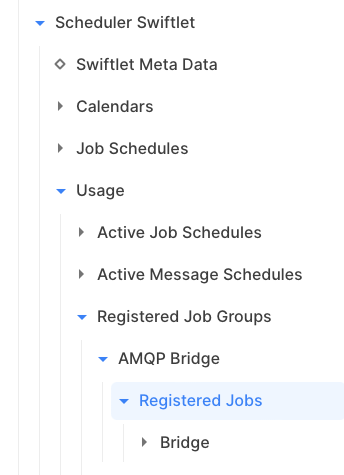
These jobs can be scheduled via the Scheduler Swiftlet to run at specific times or in intervals, based on calendars and so on.
Bridge
The Bridge job activates an AMQP bridge on the job start and deactivates it on the job stop. The name of the bridge must be specified as a parameter. The job requires setting a maximum runtime to deactivate the bridge. Otherwise, it would be active forever.
The implementation of the Bridge job is quite simple. It sets the enabled attribute to true on job start and to false on job stop. Therefore, a server bridge that should run as a job should be initially disabled.
Parameter | Mandatory | Description |
|---|---|---|
Bridge Type | Yes | Type (AMQP version) of the bridge (091 or 100). |
Bridge Name | Yes | Name of the bridge. |
Installation
The installation takes place via 'hot deployment'. See the documentation of the Deploy Swiftlet for further information.
Configuration
The configuration of the AMQP Bridge Extension Swiftlet is defined within the element
<swiftlet name="xt$amqpbridge" .../>of the router's configuration file.
Element List "connection-templates", Parent Element: "swiftlet"
Templates for Connections. This element list contains zero or more "connection-template" elements with this template definition:
Definition
Attribute | Type | Mandatory | Description |
|---|---|---|---|
name | java.lang.String | Yes | Name of this Connection Template |
idle-timeout | java.lang.Long | No | Idle Timeout (ms) |
max-frame-size | java.lang.Long | No | Maximum Frame Site (Bytes) |
container-id | java.lang.String | No | Container Id |
open-hostname | java.lang.String | No | Overwrites Hostname set in Open Frame |
input-buffer-size | java.lang.Integer | No | Network Input Buffer Size |
input-buffer-extend-size | java.lang.Integer | No | Network Input Buffer Extend Size |
output-buffer-size | java.lang.Integer | No | Network Output Buffer Size |
output-buffer-extend-size | java.lang.Integer | No | Network Output Buffer Extend Size |
session-incoming-window-size | java.lang.Integer | No | Session Incoming Window Size |
session-outgoing-window-size | java.lang.Integer | No | Session Outgoing Window Size |
source-link-credit | java.lang.Integer | No | Source Link Credit |
Values
Attribute | Values |
|---|---|
idle-timeout | Default: 120000 |
max-frame-size | Default: 131072 |
container-id | |
open-hostname | |
input-buffer-size | Min: 4096 |
input-buffer-extend-size | Min: 4096 |
output-buffer-size | Min: 4096 |
output-buffer-extend-size | Min: 4096 |
session-incoming-window-size | Min: 1 |
session-outgoing-window-size | Min: 1 |
source-link-credit | Min: 1 |
Element List "bridges100", Parent Element: "swiftlet"
AMQP 1.0 Bridges. This element list contains zero or more "bridge100" elements with this template definition:
Definition
Attribute | Type | Mandatory | Description |
|---|---|---|---|
name | java.lang.String | Yes | Name of this AMQP 1.0 Bridge |
enabled | java.lang.Boolean | No | Enables/Disables this Connection |
retryinterval | java.lang.Long | No | Retry Interval (ms) for Re-Connect |
transfer-qos | java.lang.String | No | Transfer Quality of Service |
Values
Attribute | Values |
|---|---|
enabled | Default: false |
retryinterval | Default: 60000 |
transfer-qos | Choice: at-most-once at-least-once exactly-once |
Element "source", Parent Element: "bridge100"
Source.
Definition
Attribute | Type | Mandatory | Description |
|---|---|---|---|
remote-hostname | java.lang.String | No | Remote Host |
remote-port | java.lang.Integer | No | Remote Port |
use-ssl | java.lang.Boolean | No | Establishes a SSL Connection |
sasl-enabled | java.lang.Boolean | No | Enables/Disables SASL Authentication |
sasl-anonymous-login | java.lang.Boolean | No | Use SASL Anonymous Login |
sasl-loginname | java.lang.String | No | SASL Loginname |
sasl-password | java.lang.String | No | SASL Password |
sasl-mechanism | java.lang.String | No | SASL Mechanism |
source-address | java.lang.String | No | Source Address |
source-message-selector | java.lang.String | No | Source Message Selector |
connection-template | java.lang.String | No | Connection Template |
Values
Attribute | Values |
|---|---|
remote-hostname | Default: localhost |
remote-port | Default: 5672 |
use-ssl | Default: false |
sasl-enabled | Default: true |
sasl-anonymous-login | Default: true |
sasl-loginname | |
sasl-password | |
sasl-mechanism | Default: PLAIN |
source-address | Default: sourcequeue |
source-message-selector | |
connection-template | Default: default |
Element "target", Parent Element: "bridge100"
Target.
Definition
Attribute | Type | Mandatory | Description |
|---|---|---|---|
remote-hostname | java.lang.String | No | Remote Host |
remote-port | java.lang.Integer | No | Remote Port |
use-ssl | java.lang.Boolean | No | Establishes a SSL Connection |
sasl-enabled | java.lang.Boolean | No | Enables/Disables SASL Authentication |
sasl-anonymous-login | java.lang.Boolean | No | Use SASL Anonymous Login |
sasl-loginname | java.lang.String | No | SASL Loginname |
sasl-password | java.lang.String | No | SASL Password |
sasl-mechanism | java.lang.String | No | SASL Mechanism |
target-address | java.lang.String | No | Target Address |
connection-template | java.lang.String | No | Connection Template |
Values
Attribute | Values |
|---|---|
remote-hostname | Default: localhost |
remote-port | Default: 5672 |
use-ssl | Default: false |
sasl-enabled | Default: true |
sasl-anonymous-login | Default: true |
sasl-loginname | |
sasl-password | |
sasl-mechanism | Default: PLAIN |
target-address | Default: targetqueue |
connection-template | Default: default |
Element List "bridges091", Parent Element: "swiftlet"
AMQP 0.9.1 Bridges. This element list contains zero or more "bridge091" elements with this template definition:
Definition
Attribute | Type | Mandatory | Description |
|---|---|---|---|
name | java.lang.String | Yes | Name of this AMQP 0.9.1 Bridge |
enabled | java.lang.Boolean | No | Enables/Disables this Connection |
retryinterval | java.lang.Long | No | Retry Interval (ms) for Re-Connect |
Values
Attribute | Values |
|---|---|
enabled | Default: false |
retryinterval | Default: 60000 |
Element "source", Parent Element: "bridge091"
Source.
Definition
Attribute | Type | Mandatory | Description |
|---|---|---|---|
connect-uri | java.lang.String | No | AMQP Connect URI to create the Connection |
use-ssl | java.lang.Boolean | No | Establishes a SSL Connection |
exchange-name | java.lang.String | No | Exchange Name |
exchange-type | java.lang.String | No | Exchange Type |
consumer-tag | java.lang.String | No | Consumer Tag |
queue-name | java.lang.String | No | Queue Name |
queue-option-durable | java.lang.Boolean | No | Queue is durable? |
queue-option-exclusive | java.lang.Boolean | No | Queue is exclusive? |
queue-option-autodelete | java.lang.Boolean | No | Queue is autodelete? |
routing-key | java.lang.String | No | Routing Key |
Values
Attribute | Values |
|---|---|
connect-uri | Default: amqp://admin:secret@localhost:5672/ |
use-ssl | Default: false |
exchange-name | |
exchange-type | Default: direct |
consumer-tag | |
queue-name | |
queue-option-durable | Default: false |
queue-option-exclusive | Default: false |
queue-option-autodelete | Default: false |
routing-key |
Element "target", Parent Element: "bridge091"
Target.
Definition
Attribute | Type | Mandatory | Description |
|---|---|---|---|
connect-uri | java.lang.String | No | AMQP Connect URI to create the Connection |
use-ssl | java.lang.Boolean | No | Establishes a SSL Connection |
exchange-name | java.lang.String | No | Exchange Name |
routing-key | java.lang.String | No | Routing Key |
Values
Attribute | Values |
|---|---|
connect-uri | Default: amqp://admin:secret@localhost:5672/ |
use-ssl | Default: false |
exchange-name | |
routing-key |
Element "usage", Parent Element: "swiftlet"
Active AMQP Bridges.
Element List "bridges091", Parent Element: "usage"
AMQP 0.9.1 Bridges. This element list contains zero or more "bridge091" elements with this template definition:
Definition
Attribute | Type | Mandatory | Description |
|---|---|---|---|
name | java.lang.String | Yes | Name of this AMQP 0.9.1 Bridge |
connecttime | java.lang.String | No | Connect Time of this Bridge |
last-transfer-time | java.lang.String | No | Last Transfer Time |
number-messages-transferred | java.lang.Integer | No | Number Messages transferred |
Values
Attribute | Values |
|---|---|
connecttime | |
last-transfer-time | |
number-messages-transferred | Default: 0 |
Element List "bridges100", Parent Element: "usage"
AMQP 1.0 Bridges. This element list contains zero or more "bridge100" elements with this template definition:
Definition
Attribute | Type | Mandatory | Description |
|---|---|---|---|
name | java.lang.String | Yes | Name of this AMQP 1.0 Bridge |
connecttime | java.lang.String | No | Connect Time of this Bridge |
last-transfer-time | java.lang.String | No | Last Transfer Time |
number-messages-transferred | java.lang.Integer | No | Number Messages transferred |
Values
Attribute | Values |
|---|---|
connecttime | |
last-transfer-time | |
number-messages-transferred | Default: 0 |
CLI Commands During Deployment
This Swiftlet performs the following CLI commands during deployment:
cc /sys$threadpool/pools
new amqpbridge.poll
cc /sys$threadpool/pools/amqpbridge.poll/threads
new extension.xt$amqpbridge.poller
cc /sys$threadpool/pools
new amqpbridge.client.connection
cc /sys$threadpool/pools/amqpbridge.client.connection/threads
new extension.xt$amqpbridge.client.connection
cc /sys$threadpool/pools
new amqpbridge.client.session
cc /sys$threadpool/pools/amqpbridge.client.session/threads
new extension.xt$amqpbridge.client.sessionCLI Commands During Undeployment
This Swiftlet performs the following CLI commands during undeployment:
cc /sys$threadpool/pools
delete amqpbridge.poll
delete amqpbridge.client.connection
delete amqpbridge.client.session